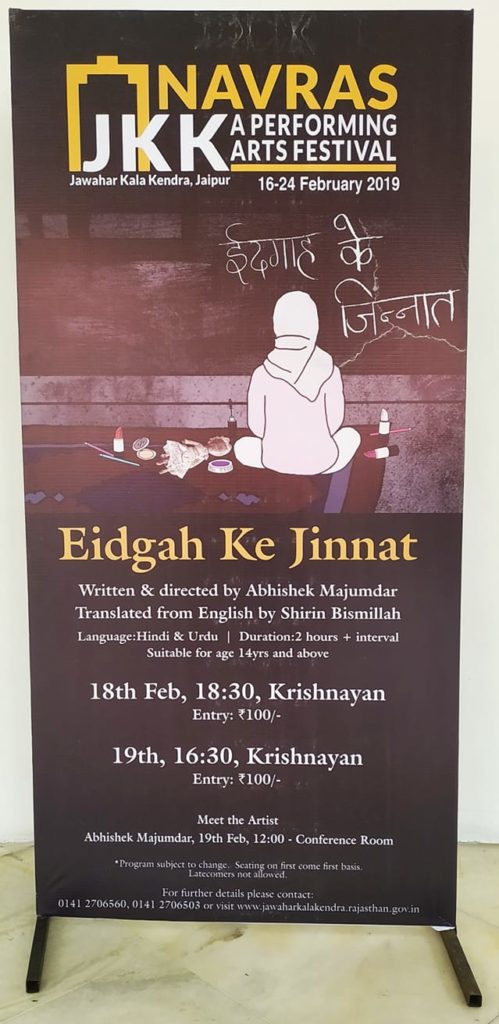On Tuesday, the staging of Abhishek Majumdar’s play Eidgah ke Jinnat was cancelled by the Jawahar Kala Kendra (JKK) following protests . A Hindi/Urdu version of the renowned 2012 play Djinns of Eidgah, the play was a part of the Navras performing arts festival in Jaipur. Based on the issue of Kashmir, the play was performed without interruption on Monday, but the second show was stopped after a group of people started shouting slogans targeting the director and the cast of the play.

The whole incident took place after a local newspaper report misrepresented the theme of the play stating that the “play depicted Army men in poor light.”
Along with the cancellation of the play, the protesters also demanded that sedition charges be slapped on the director.
Written and directed by Abhishek Majumdar, the play has been performed several times in India and abroad without any censoring in the past two years. Since the play takes up a currently sensitive topic, Kashmir, it has received a lot of criticism. Yesterday, the situation worsened when the director was forced to leave Jaipur due to safety concerns.
Majumdar is one of the finest writer and director of the country and has always been vocal about his views. Through his work, he brings to light, the issues relevant to our society , culture and democracy. The well acclaimed play stresses on the need for a dialogue in Kashmir. The whole play raises certain relevant question in our society which the government has failed to take a stand on. It sends a message highlighting the importance of having a dialogue on Kashmir along with the need to understand what motivates these young people to take up arms. The play neither portrays army men in bad light not does it condone any act of terror.
Apparently, the protesters gathered to threaten the organisers and crew members at the Navaras festival had not even watched the play. The whole denouncement of the performance happened following a newspaper report.
Speaking to the Indian Cultural Forum, managing editor of Leftword and performing artist of Jana Natya Manch, Sudhanva Deshpande said, “It is extremely unfortunate that it happened in a Congress ruled state. The administration should have protected the cast and director of the play. They should have ensured that the performance happen and not let miscreants and hindutva forces to get away with the censorship. I wish the authorities, the administration, the police and the state government had moved in such a way that the play could have been performed. The miscreants should be booked and there should be cases against them. This is not unexpected and it happens again and again, but it is really sad that it happened under a Congress ruled state.”
Censorship in Rajasthan
Last year, the Bollywood film Padmavat went through a series of hindrances ahead of its release. In the name of Rajput pride, even before the movie was screened, the state witnessed violent protests. The title of the movie was changed from Padmavati to Padmatvat following the protest organised by the Karni Sena. Along with demands on banning an unreleased – unseen movie, this fringe group also threatened both the director and the actors of the film.
A similar crackdown was witnessed yesterday when an unleashed Hindutva group wreaked havoc even before the staging of the play Eidgah ke Jinnat. As Deshpande said, “They don’t know what are they protesting against and why they are protesting. This whole thing is about censorship. The protesters have no clue about the text of the play. There were two performances that were lined up and it’s really terrible that the the second show of the play couldn’t be staged.”
Over the past four years, censorship has become a standard pattern that is being normalised by the present right-wing government. Ironically, in both the cases, the “angry” protesters had neither watched the play nor the movie and staged protests on the basis of some false assumptions.
Extending solidarity to the director and the actors, a group of artists have come up with an online petition to the Rajasthan government seeking to protect artists’ freedom of expression.
Courtesy: Indian Cultural Forum